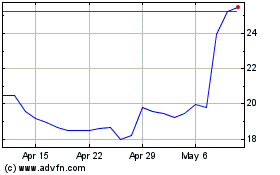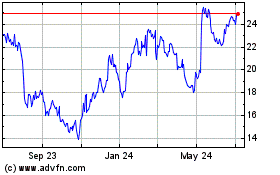Myriad Genetics Publishes Prolaris(R) Data in the Journal of Urology
February 18 2014 - 7:05AM

Myriad Genetics, Inc. (Nasdaq:MYGN) today announced it has
published data in the Journal of Urology demonstrating that its
Prolaris test accurately predicted, based on biopsy specimens,
which men would develop biochemical recurrence (BCR) or metastatic
disease following radical prostate surgery. Prolaris is a 46-gene
molecular diagnostic test that has been evaluated in more than
5,000 patients across 11 clinical studies.
"This study represents a great advance in the treatment of
prostate cancer. The results from three different institutions show
that Prolaris can better define patient prognosis and improve
care," said Jay T. Bishoff, M.D., director of the Intermountain
Urological Institute, at Intermountain Health Care and a study
investigator. "Having a test that identifies which patients are
likely to fail surgery is a big clinical advantage for physicians.
Patients with a low score may be candidates for active
surveillance, while patients with a high score indicative of
aggressive cancer, may benefit from more intensive medical
treatments."
The study evaluated biopsy specimens in 582 men who were treated
by radical prostatectomy. In the study, biopsy samples were
evaluated from three cohorts of contemporary patients in the United
States and Germany. The clinical endpoints were metastatic disease
and BCR. In all cohorts, the Prolaris test was a statistically
significant predictor of BCR and was the single strongest predictor
of metastatic disease when compared to Gleason Score or PSA. In the
pooled analysis, each one-unit increase in the Prolaris score
translated into a fivefold increased risk of metastases and a
1.6-times increased risk of BCR.
"Men newly diagnosed with prostate cancer are often treated by
radical prostatectomy, and about 30 percent of these patients will
have metastases or progress even after surgery," said Michael
Brawer, M.D., vice president of medical affairs at Myriad Genetic
Laboratories. "The Prolaris test answers an important clinical
question for all urologists concerning their surgical candidates…do
my patients have an aggressive prostate cancer or not and therefore
need more aggressive treatment?"
About Prolaris®
Prolaris is a novel 46-gene RNA-expression test that directly
measures tumor cell growth characteristics for stratifying the risk
of disease progression in prostate cancer patients. Prolaris
provides a quantitative measure of the RNA expression levels of
genes involved in the progression of tumor growth. Low gene
expression is associated with a low risk of disease progression in
men who may be candidates for surveillance and high gene expression
is associated with a higher risk of disease progression in patients
who may benefit from additional therapy. Prolaris has been
proven to predict prostate cancer-specific disease progression in
11 clinical trials with more than 5,000 patients. For more
information visit: www.prolaris.com and
www.myriad.com/understanding-prostate-cancer/.
About Myriad Genetics
Myriad Genetics is a leading molecular diagnostic company
dedicated to making a difference in patients' lives through the
discovery and commercialization of transformative tests to assess a
person's risk of developing disease, guide treatment decisions and
assess risk of disease progression and recurrence. Myriad's
molecular diagnostic tests are based on an understanding of the
role genes play in human disease and were developed with a
commitment to improving an individual's decision making process for
monitoring and treating disease. Myriad is focused on strategic
directives to introduce new products, including companion
diagnostics, as well as expanding internationally. For more
information on how Myriad is making a difference, please visit the
Company's website: www.myriad.com.
Myriad, the Myriad logo, BART, BRACAnalysis, Colaris, Colaris
AP, Melaris, Myriad myPath, Myriad myPlan, Myriad myRisk,
TheraGuide, Prezeon, Panexia, and Prolaris are trademarks or
registered trademarks of Myriad Genetics, Inc. in the United States
and foreign countries. MYGN-F, MYGN-G
Safe Harbor Statement
This press release contains "forward-looking statements" within
the meaning of the Private Securities Litigation Reform Act of
1995, including statements relating to the Prolaris clinical study
data; the effectiveness of Prolaris testing to accurately predict
cancer-specific disease progression including metastases and
biochemical recurrence; and the Company's strategic directives
under the caption "About Myriad Genetics". These
"forward-looking statements" are management's present expectations
of future events and are subject to a number of risks and
uncertainties that could cause actual results to differ materially
and adversely from those described in the forward-looking
statements. These risks include, but are not limited to: the
risk that sales and profit margins of our existing molecular
diagnostic tests and companion diagnostic services may decline or
will not continue to increase at historical rates; risks related to
changes in the governmental or private insurers reimbursement
levels for our tests; the risk that we may be unable to develop or
achieve commercial success for additional molecular diagnostic
tests and companion diagnostic services in a timely manner, or at
all; the risk that we may not successfully develop new markets for
our molecular diagnostic tests and companion diagnostic services,
including our ability to successfully generate revenue outside the
United States; the risk that licenses to the technology underlying
our molecular diagnostic tests and companion diagnostic services
tests and any future tests are terminated or cannot be maintained
on satisfactory terms; risks related to delays or other problems
with operating our laboratory testing facilities; risks related to
public concern over our genetic testing in general or our tests in
particular; risks related to regulatory requirements or enforcement
in the United States and foreign countries and changes in the
structure of the healthcare system or healthcare payment systems;
risks related to our ability to obtain new corporate collaborations
or licenses and acquire new technologies or businesses on
satisfactory terms, if at all; risks related to our ability to
successfully integrate and derive benefits from any technologies or
businesses that we license or acquire; risks related to increased
competition and the development of new competing tests and
services; the risk that we or our licensors may be unable to
protect or that third parties will infringe the proprietary
technologies underlying our tests; the risk of patent-infringement
claims or challenges to the validity of our patents; risks related
to changes in intellectual property laws covering our molecular
diagnostic tests and companion diagnostic services and patents or
enforcement in the United States and foreign countries, such as the
Supreme Court decision in the lawsuit brought against us by the
Association for Molecular Pathology et al; risks of new, changing
and competitive technologies and regulations in the United States
and internationally; and other factors discussed under the heading
"Risk Factors" contained in Item 1A of our most recent Annual
Report on Form 10-K filed with the Securities and Exchange
Commission, as well as any updates to those risk factors filed from
time to time in our Quarterly Reports on Form 10-Q or Current
Reports on Form 8-K. All information in this press release is as of
the date of the release, and Myriad undertakes no duty to update
this information unless required by law.
CONTACT: Media Contact:
Ron Rogers
(801) 584-3065
rrogers@myriad.com
Investor Contact:
Scott Gleason
(801) 584-1143
sgleason@myriad.com
Myriad Genetics (NASDAQ:MYGN)
Historical Stock Chart
From Aug 2024 to Sep 2024

Myriad Genetics (NASDAQ:MYGN)
Historical Stock Chart
From Sep 2023 to Sep 2024
